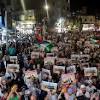Al Jazeera
2024 - 10 - 2Beirut’s Bombing: Jordan Lost in Division but United Against an Unseen Enemy!
Arab nationalism - Beirut bombings - Hezbollah - Israel - Israeli-Palestinian conflict - Jordan - Jordanian history - Lebanese politics - Lebanon - Middle East protestsJordan grapples with internal debates over Hezbollah as protests against Israeli attacks brew in Beirut. Join the conversation!
Jordan is currently experiencing significant internal division regarding the role of Hezbollah in the broader regional conflict, but a unifying sentiment against Israeli aggression in Palestine is garnering momentum. Following the recent bombings in Beirut, which have left many in shock and despair, tensions are escalating within Jordan—a nation historically known for its moderate stance in the Middle Eastern geopolitical landscape. The bewilderment over Hezbollah's actions has triggered lively discussions among Jordanian citizens, with some supporting the group as defenders of Lebanese sovereignty, while others view it as a detrimental force complicating an already tenuous situation.
As the news of relentless Israeli attacks filters through, many Jordanians are beginning to mobilize in solidarity with their Lebanese neighbors. This recent bombing has become a catalyst for what is expected to be significant anti-Israel protests across the country. While opinions regarding Hezbollah might differ, the collective anguish towards the humanitarian crises gripping Lebanon and Palestine seems to serve as a rallying point for people from diverse backgrounds. Jordanian society is increasingly showing signs of solidarity, urging for peaceful resolutions rather than military interventions that threaten regional stability.
However, despite the groundswell of public support for anti-Israeli protests, formal government reactions remain muted. The Jordanian monarchy faces a delicate balancing act; it must court its citizens' sentiments without alienating key international alliances. This predicament is exacerbated by historical ties to Israel, as well as the large Palestinian population residing in Jordan, who feel particularly affected by the ongoing violence. The potential for protests to morph into an act against the Jordanian government's policies could create a substantial political dilemma for those in power.
So, what can one expect from the foreseeable future? As protests escalate, we may witness a resurgence of grassroots activism, drawing participants from all walks of life. Whether the demonstrations will lead to impactful change or remain a cry of despair will depend not only on Jordan's political will but also on the collective will of its people to demand accountability and action related to both Israeli violence and Hezbollah's influence in the region.
Interestingly, Jordan is home to a significant number of Palestinian refugees, with estimates suggesting they make up nearly 60% of the population. This demographic reality heavily influences the nation’s stance on the Israeli-Palestinian conflict. Additionally, in previous years, King Abdullah II has urged for a ‘two-state solution’ as a long-term resolution; however, rising grassroots opposition against Australia-crafted policies could reshape political moves in the coming period. Jordan's complexity in navigating this tumultuous landscape speaks volumes about the sensitivities surrounding the issues, making the situation all the more fascinating and daunting.

Jordan divided on Hezbollah, but united against Israeli attacks on ... (Aljazeera.com)
'Shock and despair' over the bombing of Beirut is expected to give way to huge anti-Israel protests in the coming days.

Meet Fatima Sana – Pakistan's new fast-bowling cricket captain (Aljazeera.com)
From playing cricket on Karachi's streets to leading Pakistan at the World Cup, 22-year-old Sana's rise has been swift.
Explore the last week
- 2025 - 01 - 27, 14 topics across 142 articles.
- 2025 - 01 - 26, 24 topics across 346 articles.
- 2025 - 01 - 25, 14 topics across 119 articles.
- 2025 - 01 - 24, 11 topics across 99 articles.
- 2025 - 01 - 23, 17 topics across 103 articles.
- 2025 - 01 - 22, 10 topics across 74 articles.
- 2025 - 01 - 21, 20 topics across 160 articles.